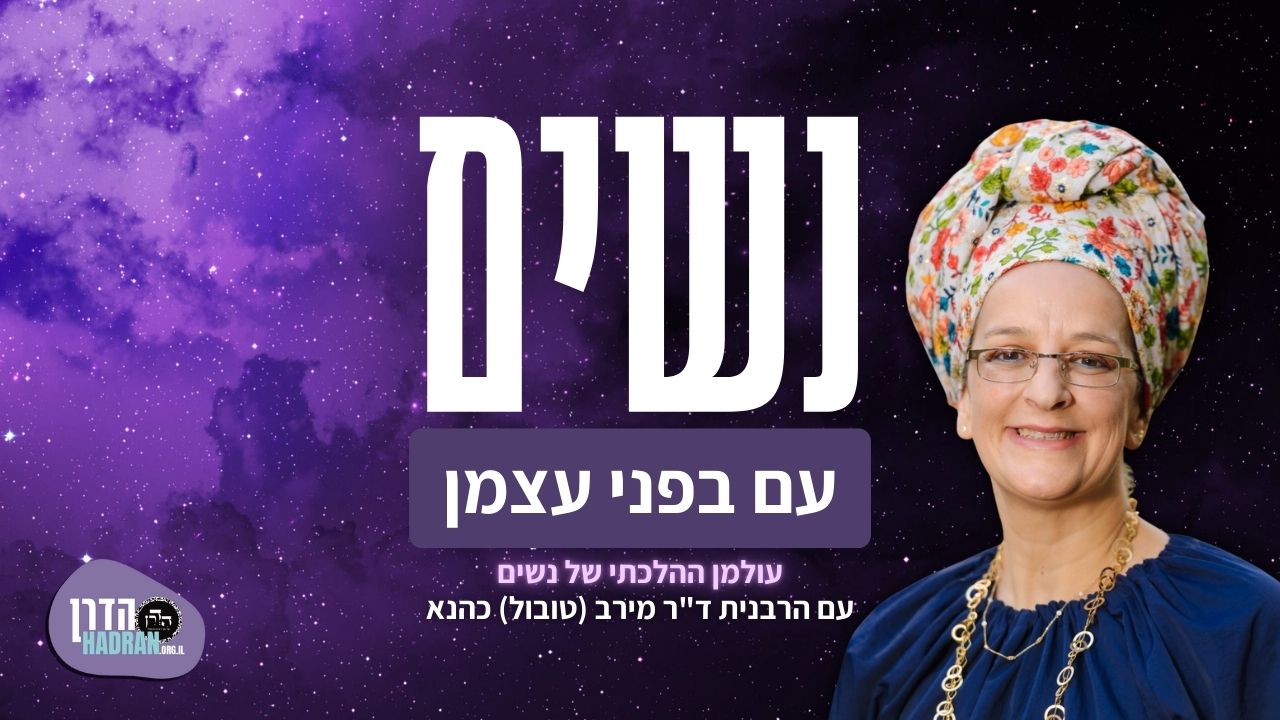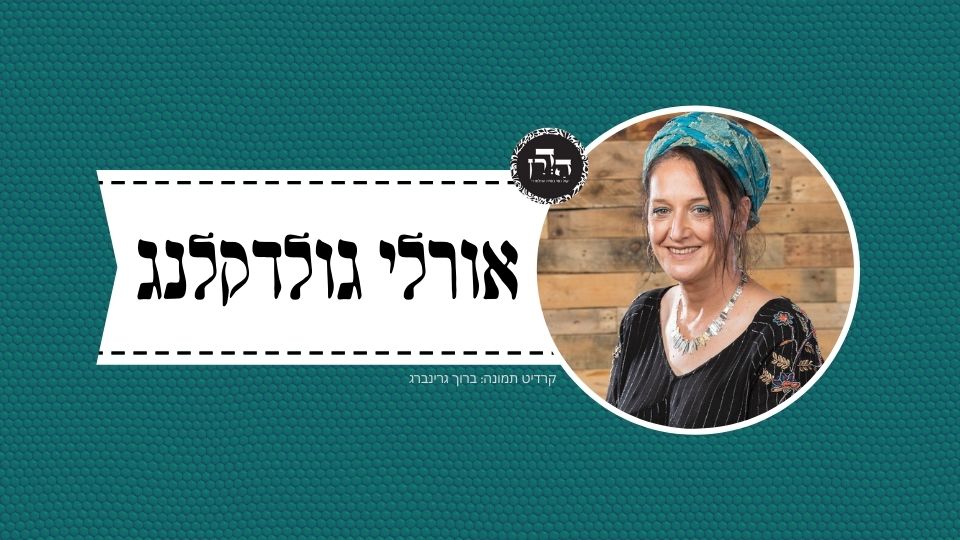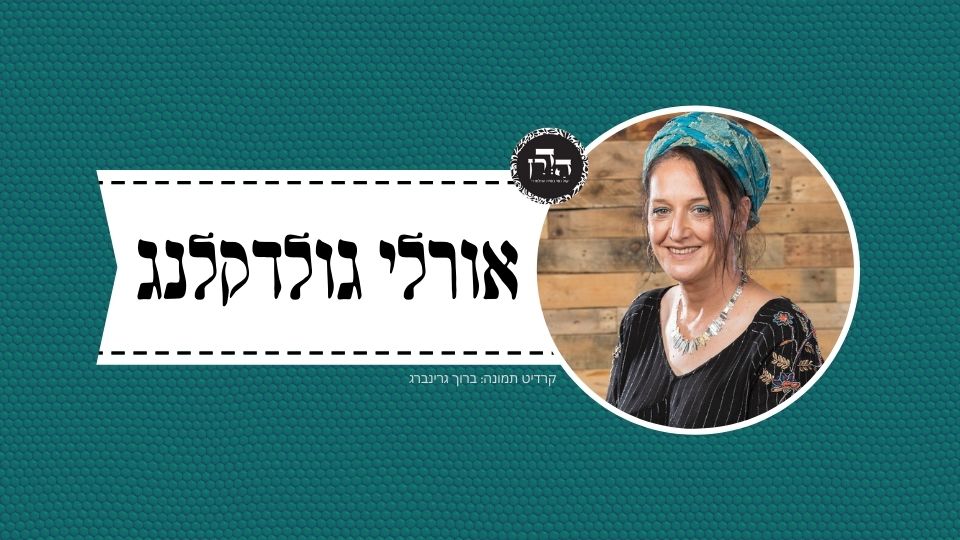מה אפשר לעשות עם וולד שאמו קיבלה מום לאחר ההקדש? האם יש פתרון? מה לגבי תמורה של אותה בהמה? המקבל בהמה מגוי כדי להוליד וולדות ומסכים להחזיר את הבהמה לשווי שלה מתחילת העסק ולהתחלק בוולדות, האם הבהמה, הוולדות, וולדי הוולדות חייבים בבכורה או פטורים? האם העכו”ם נחשב קשור לבהמות? האם ההלכה הזאת סותרת משנה אחרת בבא מציעא בעניין ריבית?
הלימוד השבוע מוקדש לזכות ולשלום הַיְימׇנוֹט אֱמוּנָה בַּת באנצ’י (קָסָאוּ) בת 11 שנעלמה במקום מגוריה בצפת, לפני שנתיים, ביום ט”ז אדר תשפ”ד (25.2.24), ולא נודעו עקבותיה.
הלימוד השבוע מוקדש למען ביטחון המדינה, החיילים והאזרחים, ולמען חירותו של העם האיראני. שנזכה בקרוב שיתקיים בנו הפסוק: "לַיְּהוּדִים הָיְתָה אוֹרָה וְשִׂמְחָה וְשָׂשֹׂן וִיקָר”.
רוצה להקדיש שיעור?

כלים
הלימוד השבוע מוקדש לזכות ולשלום הַיְימׇנוֹט אֱמוּנָה בַּת באנצ’י (קָסָאוּ) בת 11 שנעלמה במקום מגוריה בצפת, לפני שנתיים, ביום ט”ז אדר תשפ”ד (25.2.24), ולא נודעו עקבותיה.
הלימוד השבוע מוקדש למען ביטחון המדינה, החיילים והאזרחים, ולמען חירותו של העם האיראני. שנזכה בקרוב שיתקיים בנו הפסוק: "לַיְּהוּדִים הָיְתָה אוֹרָה וְשִׂמְחָה וְשָׂשֹׂן וִיקָר”.
כלים
העמקה
רוצה להבין מה באמת קורה מתחת לפני השטח של הסוגיה?
שיעורים, פודקאסטים והרחבות של מיטב המורות שלנו יפתחו לך עוד זוויות וכיווני חשיבה.
חדשה בלימוד הגמרא?
זה הדף הראשון שלך? איזו התרגשות עצומה! יש לנו בדיוק את התכנים והכלים שיעזרו לך לעשות את הצעדים הראשונים ללמידה בקצב וברמה שלך, כך תוכלי להרגיש בנוח גם בתוך הסוגיות המורכבות ומאתגרות.
פסיפס הלומדות שלנו
גלי את קהילת הלומדות שלנו, מגוון נשים, רקעים וסיפורים. כולן חלק מתנועה ומסע מרגש ועוצמתי.
בכורות טז
לְאֵתוֹיֵי חֲלָבוֹ.
serves to include its milk in the prohibition, i.e., it is prohibited to consume milk of disqualified consecrated animals that were redeemed.
אָמַר מָר: אֵין נִפְדִּין תְּמִימִין, וְאֵין מַתְפִּיסָן לְכׇל זֶבַח שֶׁיִּרְצֶה. תְּמִימִים הוּא דְּלָא מִיפַּרְקִי, הָא בַּעֲלֵי מוּמִין — מִיפַּרְקִי. לְכׇל שֶׁיִּרְצֶה הוּא דְּאֵין מַתְפִּיסָן, הָא לְאוֹתוֹ זֶבַח — מַתְפִּיסָן.
The Gemara analyzes the baraita. The Master said above: With regard to disqualified sacrificial animals whose consecration preceded their blemish, their offspring are sacred and may not be redeemed while they are unblemished, and one may not dedicate them as any offering he desires. The Gemara infers: It is only unblemished offspring that one may not redeem, which indicates that one may redeem blemished offspring. Likewise, it is only for any offering he desires that he may not dedicate the offspring, but for the same offering as the mother, one may dedicate the offspring.
הֵיכִי מַשְׁכַּחַתְּ לַהּ? דְּמַתְפִּיסָן לְאוֹתוֹ זֶבַח, וְנִפְדִּין בְּמוּמָן. נֵימָא תֶּיהְוֵי תְּיוּבְתָּא דְּרַב הוּנָא?
The Gemara asks: How can you find a situation that includes both of these inferences? They apply in a case where one dedicates the unborn offspring as the same offering for which its mother was consecrated, and it may then be redeemed after having developed a blemish. The Gemara remarks: Shall we say that this is a conclusive refutation of the opinion of Rav Huna, who maintains that the offspring cannot be redeemed and rules that one must leave them to die?
אָמַר לְךָ רַב הוּנָא: הוּא הַדִּין דַּאֲפִילּוּ בַּעֲלֵי מוּמִין אֵין נִפְדִּין, וְאַיְּידֵי דִּתְנָא רֵישָׁא ״נִפְדִּין תְּמִימִים״ — תְּנָא נָמֵי סֵיפָא ״אֵין נִפְדִּין תְּמִימִים״, וְאַיְּידֵי דִּתְנָא רֵישָׁא ״לְכׇל זֶבַח שֶׁיִּרְצֶה״ — תְּנָא נָמֵי סֵיפָא ״לְכׇל זֶבַח שֶׁיִּרְצֶה״.
Rav Huna could have said to you: The inferences upon which the refutation is based are false. Just as these unblemished offspring cannot be redeemed, the same is true with regard to blemished animals, as even blemished offspring cannot be redeemed. And since the former clause taught the phrase: They may be redeemed unblemished, the latter clause also taught the phrase: They may not be redeemed unblemished. And since the former clause taught: As any offering he desires, the latter clause also taught: As any offering he desires. According to Rav Huna, no inferences can be made from these rulings of the baraita because they were phrased in this manner for the sake of symmetry between its two sections, rather than to teach a specific halakha.
וְהַשּׁוֹחֲטָן בַּחוּץ פָּטוּר. רַב הוּנָא מַתְנֵי חַיָּיב, וּמוֹקֵים לַהּ בְּדוּקִין שֶׁבְּעַיִן, וְאַלִּיבָּא דְּרַבִּי עֲקִיבָא דְּאָמַר: אִם עָלוּ לֹא יֵרְדוּ.
It is stated: And one who slaughters them outside the Temple courtyard is exempt from karet. The Gemara notes: Rav Huna taught this as: One who slaughters them outside the Temple courtyard is liable to receive karet, and he interprets it as referring to a case involving an animal with a minor blemish, such as on the cornea of the eye. And the mishna is in accordance with the opinion of Rabbi Akiva, who says: Although animals with a minor blemish may not be sacrificed ab initio, if they ascended the altar they shall not descend and are sacrificed. Since an animal with a minor blemish is potentially suitable for sacrifice, one who slaughters it outside the Temple courtyard is liable to receive karet.
בֵּין לִפְנֵי פִּדְיוֹנוֹ בֵּין לְאַחַר פִּדְיוֹנוֹ עוֹשֶׂה תְּמוּרָה. אָמַר רַב נַחְמָן אָמַר רַבָּה בַּר אֲבוּהּ: וּתְמוּרָתוֹ לְאַחַר פִּדְיוֹנוֹ מֵתָה. מַאי טַעְמָא? הֵיכִי לֶיעְבֵּיד? לַיקְרְבַיהּ — מִכֹּחַ קְדוּשָּׁה דְּחוּיָה קָאָתְיָא, לִיפְרְקַהּ — לָא אַלִּימָא לְמִיתְפַּס פִּדְיוֹנָהּ, הִלְכָּךְ מֵתָה.
The Gemara continues analyzing the baraita, which teaches: Whether before its redemption or after its redemption, an animal whose consecration preceded its blemish renders an animal that was a substitute for it sacred. Rav Naḥman says that Rabba bar Avuh says: And its substitute that was imbued with sanctity after its redemption must die. What is the reason? The Gemara explains: What are we to do? Shall we sacrifice it? It cannot be sacrificed, as it received its status from the deferred sanctity of the redeemed blemished animal and is therefore unfit for the altar. Shall we redeem it? It cannot be redeemed, as its sanctity is not strong enough to be transferable to the money for its redemption. Therefore, it must die.
מַתְקֵיף לַהּ רַב עַמְרָם: וְתִיתְּכִיל בְּמוּמָהּ לַבְּעָלִים! וְכִי מָה בֵּין זוֹ לִתְמוּרַת בְּכוֹר וּמַעֲשֵׂר? דִּתְנַן: תְּמוּרַת בְּכוֹר וּמַעֲשֵׂר, הֵן וּוְלָדָן וּוְלַד וְלָדָן עַד סוֹף כׇּל הָעוֹלָם — הֲרֵי הֵן כִּבְכוֹר וּמַעֲשֵׂר, וְיֵאָכְלוּ בְּמוּמָן לַבְּעָלִים!
Rav Amram objects to this: But let the substitute be eaten in its blemished state by the owners. After all, what is the difference between this substitute and the substitute of a firstborn or of an animal tithe offering, which may be eaten? The Gemara explains the question: As we learned in a mishna (Temura 21a): With regard to the substitute of a firstborn and of an animal tithe offering, both they, the substitutes themselves, and their offspring, and the offspring of their offspring, forever, i.e., for all future generations, are like the firstborn and the animal tithe offering, respectively, and therefore they are eaten in their blemished state by the owners. Why is the blemished substitute of a firstborn or an animal tithe permitted whereas the substitute of a disqualified consecrated animal remains forbidden?
אֲמַר לֵיהּ אַבָּיֵי: זֶה שֵׁם אִמּוֹ עָלָיו וְזֶה שֵׁם אִמּוֹ עָלָיו, זֶה כּוּלּוֹ תְּמוּרַת בְּכוֹר וּמַעֲשֵׂר מִיקַּרְיָא, מָה בְּכוֹר וּמַעֲשֵׂר בְּמוּמָן מִיתְאַכְלָן לַבְּעָלִים, אַף תְּמוּרָתָן מִיתְאַכְלָא.
Abaye said to Rav Amram: This one bears its mother’s name and that one bears its mother’s name, i.e., each substitute is subject to the same halakha as the animal for which it was substituted. This animal is entirely called a substitute of a firstborn or an animal tithe offering: Just as a firstborn and an animal tithe offering are eaten in their blemished state by the owners, so too, their substitute is eaten even when it is blemished.
וְזֶה שֵׁם אִמּוֹ עָלָיו, תְּמוּרַת קָדָשִׁים מִיקַּרְיָא, מָה קָדָשִׁים לָא מִיתַּכְלִי אֶלָּא בְּפִדְיוֹן — אַף תְּמוּרָתָן נָמֵי לָא מִיתַּכְלִי אֶלָּא בְּפִדְיוֹן, וְהָא לָא אַלִּימָא לְמִיתְפַּס פִּדְיוֹנַהּ.
And likewise, this substitute for a redeemed animal whose consecration preceded its blemish bears its mothers name, i.e., it is called the substitute of a sacrificial animal: Just as sacrificial animals are eaten only once they have been rendered permitted through redemption, so too, their substitutes are also eaten only through redemption. But the sanctity of this particular substitute is not strong enough to be transferable to money for its redemption, and therefore it cannot be redeemed. Consequently, it may not be eaten.
תַּנְיָא כְּוָותֵיהּ דְּרַב נַחְמָן: מִנַּיִן לִתְמוּרַת פְּסוּלֵי הַמּוּקְדָּשִׁין שֶׁמֵּתָה? תַּלְמוּד לוֹמַר: ״מִמַּעֲלֵי הַגֵּרָה… טָמֵא״, הַאי מִיבְּעֵי לֵיהּ לְחָמֵשׁ חַטָּאוֹת מֵתוֹת! הָהוּא מִ״מַּפְרִיסֵי הַפַּרְסָה טָמֵא״ נָפְקָא.
The Gemara notes that it is taught in a baraita in accordance with the opinion of Rav Naḥman: From where is it derived with regard to the substitute of disqualified consecrated animals that it must die? It is derived from a verse, as the verse states: “Nevertheless, these you shall not eat, of them that only chew the cud, or of them that only have a split hoof…it is impure to you” (Leviticus 11:4). The extraneous phrase “impure to you” indicates that there exists an animal which possesses the signs of a kosher animal but is nevertheless prohibited in consumption, and that is the substitute of a disqualified consecrated animal. The Gemara raises an objection: But isn’t that extraneous phrase necessary for the halakha of the five sin offerings that are left to die, which may not be eaten? The Gemara answers: No; that halakha is derived from the phrase: “Of them that only have a split hoof…is impure.”
תַּנְיָא נָמֵי הָכִי: מִנַּיִן לְחָמֵשׁ חַטָּאוֹת מֵתוֹת? תַּלְמוּד לוֹמַר: ״מִמַּפְרִיסֵי הַפַּרְסָה… טָמֵא״. חָמֵשׁ חַטָּאוֹת מֵתוֹת, הִילְכְתָא גְּמִירִי לַהּ, אֶלָּא כִּי אֲתָא קְרָא לִתְמוּרַת אָשָׁם.
The Gemara notes that this is also taught in a baraita: From where is it derived that there are five sin offerings that are left to die? The verse states: “Of them that have a split hoof…is impure to you,” which indicates that there is a second category of animals that possess the signs of a kosher animal, but that are nevertheless prohibited in consumption. The Gemara raises an objection: But isn’t the category of the five sin offerings that are left to die a halakha learned as a tradition, not from a verse? Rather, when that verse came, it came to teach that the substitute of a guilt offering may not be sacrificed and is left to graze until it develops a blemish.
תְּמוּרַת אָשָׁם נָמֵי הִילְכְתָא הִיא, כֹּל שֶׁבַּחַטָּאת מֵתָה — בָּאָשָׁם רוֹעֶה!
The Gemara raises a further objection: The halakha of a substitute for a guilt offering is also a halakha learned as a tradition, as stated in the principle: In any case where a sin offering is left to die, a guilt offering is left to graze. Since the substitute of a sin offering is left to die, it is established by tradition that the substitute of a guilt offering is left to graze, and therefore no verse is required to teach this halakha.
אֶלָּא, לְעוֹלָם חָמֵשׁ חַטָּאוֹת מֵתוֹת, וְאִצְטְרִיךְ קְרָא וְאִצְטְרִיךְ הִילְכְתָא, דְּאִי מִקְּרָא הֲוָה אָמֵינָא לִרְעִיָּיה, קָא מַשְׁמַע לַן הִילְכְתָא לְמִיתָה. וְאִי מֵהִילְכְתָא הֲוָה אָמֵינָא: הֵיכָא דַּעֲבַד אִיקְּרִי וַאֲכַל מֵהָנֵי חָמֵשׁ חַטָּאוֹת — אִיסּוּרָא אִיכָּא, לָאו לֵיכָּא, קָמַשְׁמַע לַן דְּאִיכָּא לָאו.
The Gemara answers: Rather, the verse is actually the source for a halakha that applies to the five sin offerings left to die. And both a verse is necessary and the halakha learned as a tradition is also necessary to determine the final course of action that one should take. The Gemara elaborates: If the concept of the five sin offerings had been derived from the verse alone, I would say that the five sin offerings are left to graze. Therefore, the halakha learned through tradition teaches us that they are left to die. And if this ruling were based only on the halakha learned as a tradition, I would say: In a case where one happened to eat from one of these five sin offerings, there is a prohibition that he violated, but not a negative mitzva, for which one is liable to receive lashes. The verse therefore teaches us that there is a negative mitzva here as well.
וְאִיבָּעֵית אֵימָא: לְאַקּוֹשֵׁי דָּבָר הַבָּא מִמַּעֲלֵי גֵּרָה לְדָבָר הַבָּא ״מִמַּפְרִיסֵי הַפַּרְסָה״, מָה לְהַלָּן בְּמִיתָה — אַף כָּאן בְּמִיתָה.
And if you wish, say instead that the halakha of the five sin offerings left to die is in fact a halakha learned as a tradition, and therefore no verse is required for its own sake. Rather, the verse: “Of them that have a split hoof,” serves to juxtapose an item that comes, i.e., that is derived, from the mention of animals who chew their cud, referring to the substitutes of disqualified consecrated animals, with an item that comes from animals who have a split hoof, referring to the five sin offerings: Just as there, the sin offerings are left to die, so too here, the substitutes are left to die.
מַתְנִי׳ הַמְקַבֵּל צֹאן בַּרְזֶל מִן הַגּוֹי —
MISHNA: With regard to one who receives animals as part of a guaranteed investment from a gentile, i.e., the Jew receives the animals to raise them and commits to pay a fixed price at a later date even if they die or their value decreases, and the offspring born in the interim are divided between the gentile and the Jew,
וַלְדוֹתֵיהֶן פְּטוּרִין, וַלְדֵי וַלְדוֹתֵיהֶן חַיָּיבִין. הֶעֱמִיד וַלְדוֹתֵיהֶן תַּחַת אִמּוֹתֵיהֶן — וַלְדֵי וְלָדוֹת פְּטוּרִין, וּוַלְדֵי וַולְדֵי וְולָדוֹת חַיָּיבִים. רַבָּן שִׁמְעוֹן בֶּן גַּמְלִיאֵל אוֹמֵר: אֲפִילּוּ עַד עֲשָׂרָה פְּטוּרִים, שֶׁאַחְרָיוּתָן לַנׇּכְרִי.
their direct offspring are exempt from the mitzva of the firstborn if they give birth to a male, but the offspring of their direct offspring are obligated in the mitzva of the firstborn if they gave birth to a male. If the Jew established their offspring in place of their mothers for collection in case the mothers die, the offspring of their direct offspring are exempt and the offspring of the offspring of their direct offspring are obligated. Rabban Shimon ben Gamliel says: Even until ten generations, the offspring are exempt, as they all serve as a guarantee for the gentile, because if he does not receive the fixed payment for the animal, he will collect his debt from any offspring born to it or its offspring.
רָחֵל שֶׁיָּלְדָה מִין עֵז, וְעֵז שֶׁיָּלְדָה מִין רָחֵל — פְּטוּרָה מִן הַבְּכוֹרָה, וְאִם יֵשׁ בּוֹ מִקְצָת סִימָנִין — חַיָּיב.
A ewe that gave birth to a goat of sorts and a goat that gave birth to a ewe of sorts are exempt from the mitzva of the firstborn. And if the offspring has some of the characteristics of its mother, it is obligated in the mitzva of firstborn.
גְּמָ׳ לְמֵימְרָא, דְּכֵיוָן דְּלָא נָקֵט מָרָא זוּזֵי — בִּרְשׁוּתָא דְּמָרָא קָיְימָא?
GEMARA: The mishna teaches that animals given to a Jew as a guaranteed investment by a gentile are not subject to their offspring being counted a firstborn because they belong to the gentile. The Gemara suggests: Is this to say that since the owner did not yet take the money that will be owed to him, the investment itself stands in the owner’s possession, i.e., the owner is still regarded as such?
וּרְמִינְהוּ: אֵין מְקַבְּלִין צֹאן בַּרְזֶל מִיִּשְׂרָאֵל מִפְּנֵי שֶׁהוּא רִבִּית, אַלְמָא בִּרְשׁוּתָא דִּמְקַבֵּל קָיְימָא!
And the Gemara raises a contradiction to this conclusion from a mishna (Bava Metzia 70b): One may not accept from a Jew sheep to raise or other items to care for as a guaranteed investment, in which the terms of the transaction dictate that the one accepting the item takes upon himself complete responsibility to repay its value in the event of depreciation or loss, but receives only part of the profit. This is because it is a loan, as the principal is fixed and always returned to the owner, and any additional sum the owner receives is interest. The Gemara remarks: Evidently, the investment stands in the possession of the recipient, as otherwise it would not be considered a loan.
אָמַר אַבָּיֵי: לָא קַשְׁיָא, הָא דְּקַבֵּיל עֲלֵיהּ אוּנְסָא וְזוֹלָא, וְהָא דְּלָא קַבֵּיל עֲלֵיהּ אוּנְסָא וְזוֹלָא.
Abaye said: This is not difficult. This case, i.e., the mishna here, is where the gentile owner of the sheep accepts upon himself the responsibility for losses due to an accident or depreciation in the market value, and that is why the sheep are considered to still belong to him. And that case, the mishna in Bava Metzia, is where the owner did not accept upon himself responsibility for losses due to an accident or depreciation. Therefore, the guaranteed investment stands in the possession of the recipient.
אֲמַר לֵיהּ רָבָא: דְּקַבֵּיל עֲלֵיהּ אוּנְסָא וְזוֹלָא, ״צֹאן בַּרְזֶל״ קָרֵית לֵיהּ? וְעוֹד, מַאי פַּסְקָא?
Rava said to Abaye: If the owner accepted upon himself responsibility for losses due to an accident or depreciation, can you call it a guaranteed investment? This case is not a guaranteed investment, as the owner is not guaranteed to receive what he had given; rather, it is a type of joint business venture that is permitted between two Jews. And furthermore, if the term: Guaranteed investment, can refer to two different kinds of investments, then why was it stated without qualification in both mishnayot?
וְעוֹד, אַדְּתָנֵי סֵיפָא אֲבָל מְקַבְּלִין צֹאן בַּרְזֶל מִן הַגּוֹי — לִיפְלוֹג וְלִיתְנֵי בְּדִידַהּ: בַּמֶּה דְּבָרִים אֲמוּרִים? דְּלָא קַבֵּיל עֲלֵיהּ אוּנְסָא וְזוֹלָא, אֲבָל קַבֵּיל עֲלֵיהּ אוּנְסָא וְזוֹלָא — שַׁפִּיר דָּמֵי!
Rava continued: And furthermore, even if one grants that this arrangement can be called a guaranteed investment, there is another difficulty. Instead of the tanna teaching in the latter clause of the mishna in Bava Metzia: But one may accept a guaranteed investment from gentiles, let the tanna distinguish and teach within the case itself, that of accepting a guaranteed investment from a Jew. He should have taught: In what case is this statement, i.e., that one may not accept from a Jew sheep to raise or other items to care for as a guaranteed investment, said? It is in a case when the owner did not accept upon himself responsibility for losses due to an accident or depreciation, but if the owner accepted upon himself responsibility for losses due to an accident or depreciation, one may well enter into such an arrangement.
אֶלָּא אָמַר רָבָא: אִידֵּי וְאִידֵּי דְּלָא קַבֵּיל עֲלֵיהּ אוּנְסָא וְזוֹלָא, וְהָכָא גַּבֵּי בְּכוֹרָה הַיְינוּ טַעְמָא, דְּאִילּוּ אָתֵי גּוֹי בָּעֵי זוּזֵי וְלָא יָהֵיב לֵיהּ — תָּפֵיס לַהּ לִבְהֵמָה, וְאִי לָא מַשְׁכַּח לַהּ לִבְהֵמָה — תָּפֵיס וְלָדוֹת דִּידַהּ, וַהֲרֵי יַד גּוֹי בָּאֶמְצַע, וְכֹל יַד גּוֹי בָּאֶמְצַע — פְּטוּרָה מִן הַבְּכוֹרָה.
Rather, Rava rejected this explanation and said: Both this case in the mishna here and that case in Bava Metzia are discussing a situation where the owner did not accept upon himself responsibility for losses due to an accident or depreciation. And here, with regard to the firstborn, this is the reason that the offspring are exempt from the halakhot of a firstborn: Since, if the gentile comes and wants his money, and the Jew does not give it to him, the gentile will seize the animal, and if he does not find the animal he will seize the offspring, this means that the hand of a gentile is in the middle, i.e., even though the animals stand in the possession of the recipient, the gentile has some degree of ownership over the bodies of the offspring. And there is a halakha: In every case where the hand of a gentile is in the middle, the animal is exempt from the halakhot of a firstborn.
הֶעֱמִיד וַלְדוֹתֵיהֶן תַּחַת אִמּוֹתֵיהֶן — וַלְדֵי וְלָדוֹת פְּטוּרִים. אָמַר רַב הוּנָא: וְלָדוֹת פְּטוּרִין, וַולְדֵי (ולדותיהן) [וְלָדוֹת] חַיָּיבִין. וְרַב יְהוּדָה אָמַר: וַלְדֵי וְלָדוֹת נָמֵי פְּטוּרִין, וַולְדֵי וַלְדֵי וְלָדוֹת חַיָּיבִין.
§ The mishna teaches: If the Jew established their offspring in place of their mothers for collection in case the mothers die, the offspring of their direct offspring are exempt. The Gemara cites a dispute with regard to animals involved in a guaranteed investment, in a case where the Jew did not establish their offspring in the place of their mothers. Rav Huna says: Their direct offspring are exempt, but the offspring of their direct offspring are obligated. And Rav Yehuda says: The offspring of their direct offspring are also exempt, and the offspring of the offspring of their direct offspring are obligated.
תְּנַן: הֶעֱמִיד וְלָדוֹת תַּחַת אִמּוֹתֵיהֶן — וַלְדֵי וְלָדוֹת פְּטוּרִין. טַעְמָא דְּהֶעֱמִיד, הָא לֹא הֶעֱמִיד — לָא. תְּיוּבְתָּא דְרַב יְהוּדָה!
The Gemara raises an objection to the opinion of Rabbi Yehuda. We learned in the mishna: If the Jew established their offspring in place of their mothers for collection in case the mothers die, the offspring of their direct offspring are exempt. The Gemara infers: The reason they are exempt is that he established the offspring in place of their mothers; but if he did not establish them in place of their mothers, they are not exempt. This is apparently a conclusive refutation of the opinion of Rabbi Yehuda.
אָמַר לָךְ רַב יְהוּדָה: הוּא הַדִּין, אַף עַל גַּב דְּלֹא הֶעֱמִיד, וְהָא קָא מַשְׁמַע לַן: אֲפִילּוּ הֶעֱמִיד נָמֵי.
The Gemara answers that Rav Yehuda could have said to you: That inference is incorrect, as the same is true even though he did not establish the offspring in place of their mothers. In that case as well, the offspring of their offspring are exempt. And this is what the mishna is teaching us by stating the halakha in that manner: Even if he established the offspring in place of the mother, only the first two generations of offspring are exempt, but not all successive generations.
דְּאוֹרְחֵיהּ דְּגוֹי לְמִיתְפַּס בְּנָהּ, וְהָוֵי כְּמִי דְּלֹא הֶעֱמִיד — וַלְדֵי וְלָדוֹת פְּטוּרִין, וַולְדֵי וַלְדֵי וְלָדוֹת חַיָּיבִין.
And it is necessary to teach this halakha that although he established the offspring in place of their mothers all successive generations are not exempt, as one might think that it is the normal manner of the gentile to seize not only the direct offspring, but her young of any generation as payment, which would mean that all successive generations are exempt. And therefore the mishna teaches that he is like one who did not establish the offspring in place of the mother, which means that the offspring of the direct offspring are exempt, but the offspring of the offspring of the direct offspring are obligated.
תְּנַן: רַבָּן שִׁמְעוֹן בֶּן גַּמְלִיאֵל אוֹמֵר: אֲפִילּוּ עַד עֲשָׂרָה דּוֹרוֹת פְּטוּרִין, שֶׁאַחְרָיוּתָן לַנׇּכְרִי. בִּשְׁלָמָא לְרַב יְהוּדָה דְּאָמַר: נָחֵית תַּנָּא קַמָּא לְדָרֵי —
The Gemara raises an objection to the opinion of Rav Huna. We learned in the mishna that Rabban Shimon ben Gamliel says: Even until ten generations the offspring are exempt, as they serve as a guarantee for the gentile, because if he does not receive the fixed payment for the animal he will collect his debt from any offspring born to it or its offspring. Rabban Shimon ben Gamliel’s use of the term: Even, indicates that he disagrees with the first tanna only with regard to how many generations of offspring are exempt, but both agree that at least some generations are exempt. Granted, according to Rav Yehuda, who says that, in exempting from firstborn status, the first tanna descended to two generational levels,







































